9A unit4 Growing up welcome to the unit 教学课件
文档属性
| 名称 | 9A unit4 Growing up welcome to the unit 教学课件 |

|
|
| 格式 | zip | ||
| 文件大小 | 2.1MB | ||
| 资源类型 | 教案 | ||
| 版本资源 | 牛津译林版 | ||
| 科目 | 英语 | ||
| 更新时间 | 2015-09-30 00:00:00 | ||
图片预览



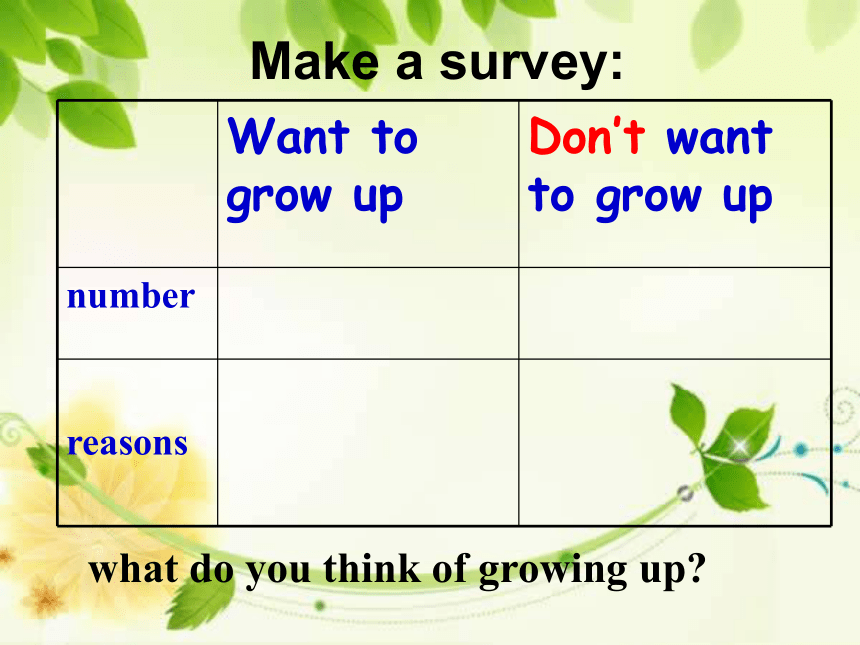
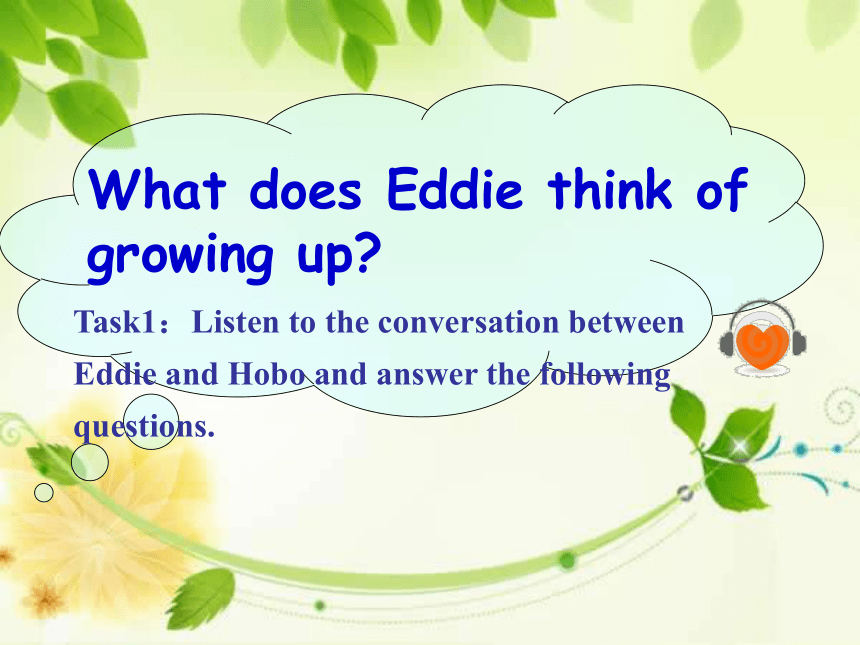
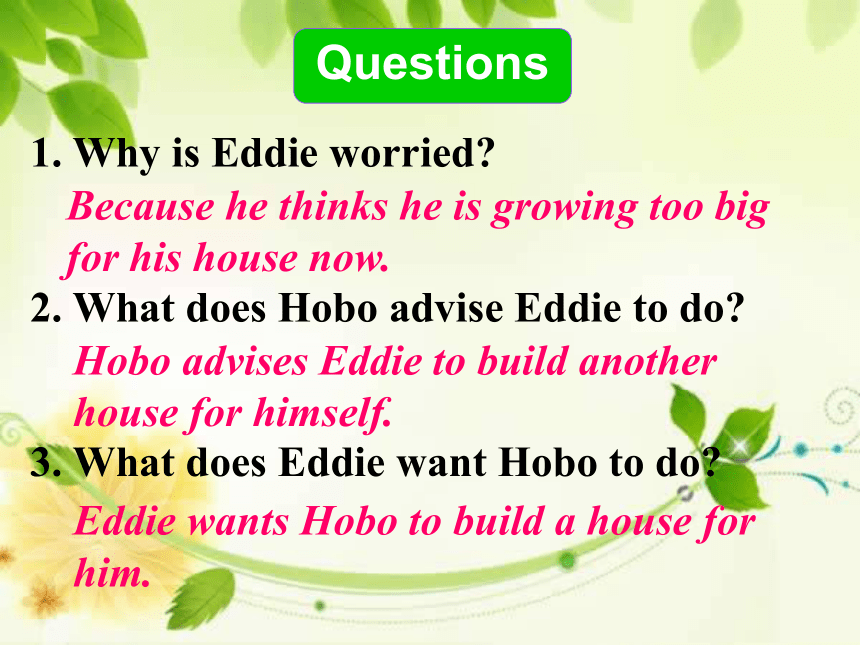
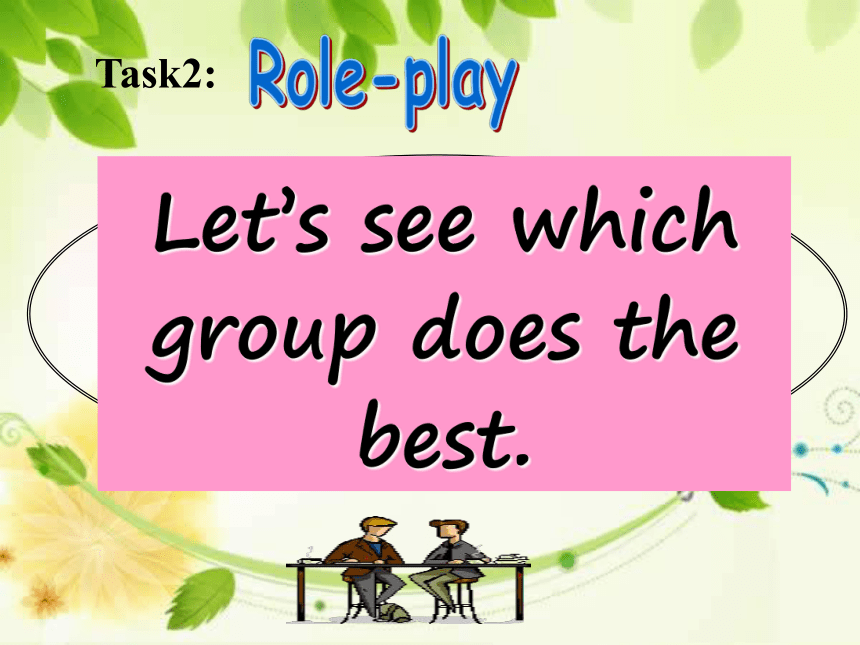
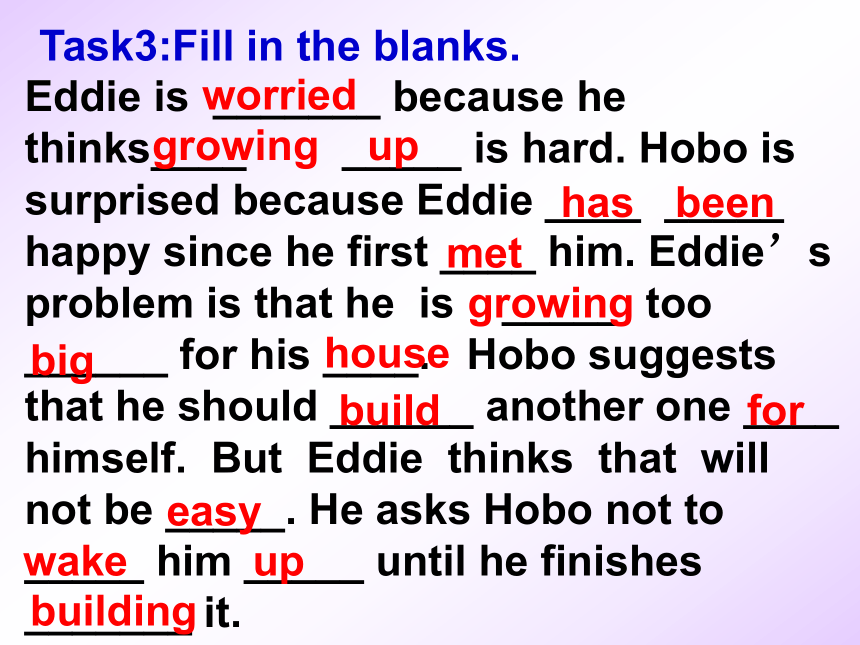
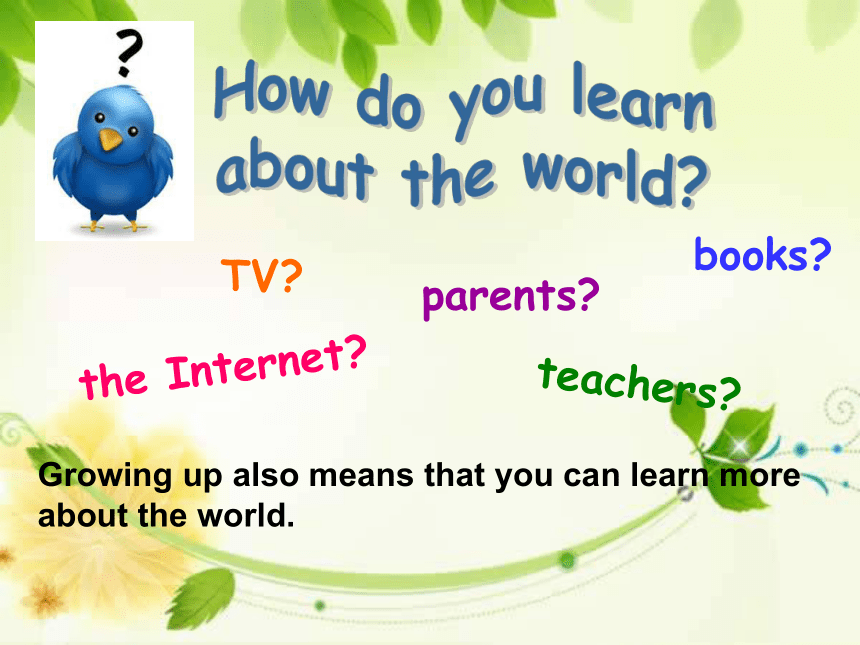
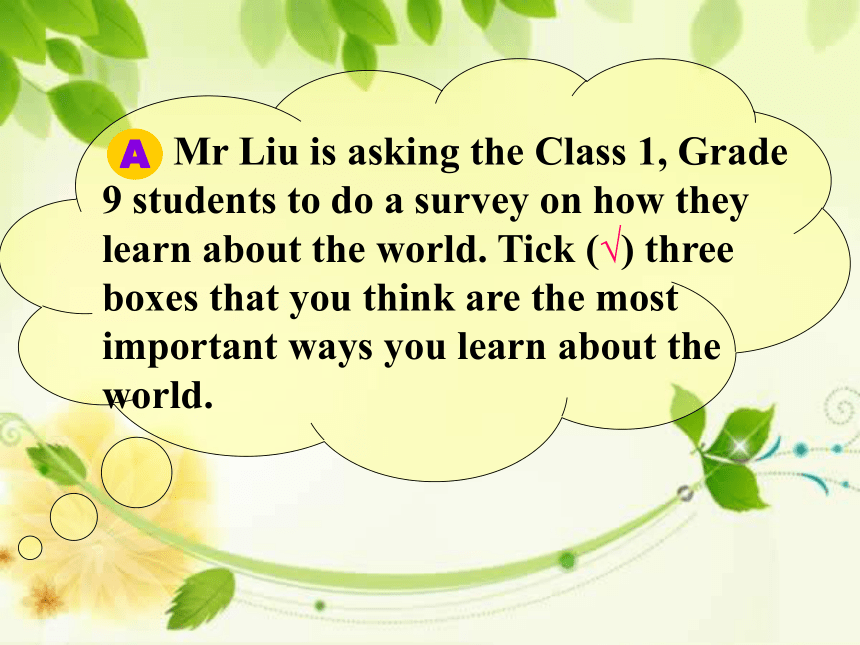

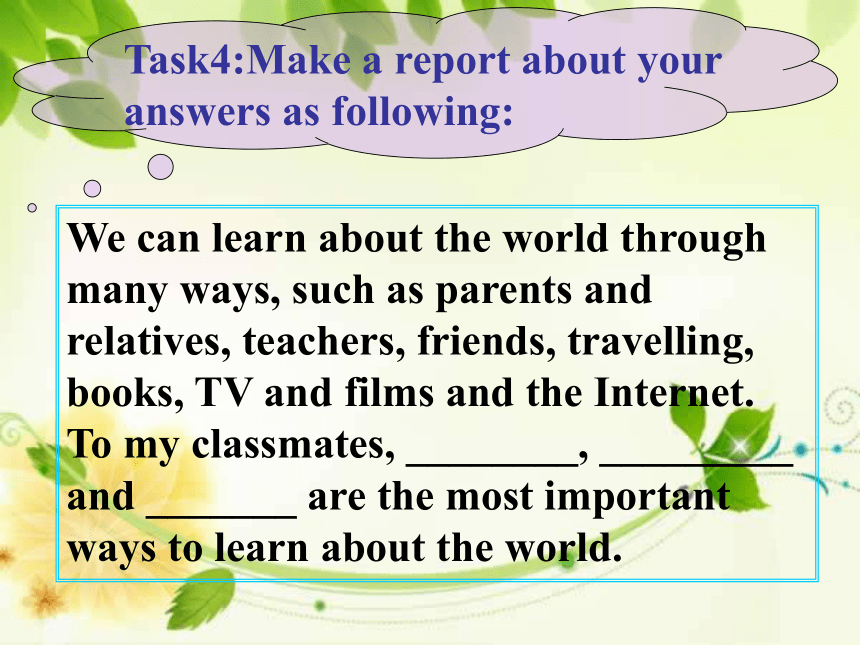
文档简介
课件31张PPT。Welcome to the unit Unit 4 Growing up on one’s mind
time
whenever
through
as soon as
deal
a great deal (of) 挂在心上;惦念
n. 时期;时代
conj. 无论何时
prep. 以,凭借
一……就
n. 很多
大量,许多1. What’s your age/ height/ weight now?
2. Do you still remember your height and your weight when you first came to this school?
3. Do you want to grow up?
Why or why not?
Free talk:Make a survey:what do you think of growing up?Task1:Listen to the conversation between Eddie and Hobo and answer the following questions.What does Eddie think of growing up?Questions 1. Why is Eddie worried?
2. What does Hobo advise Eddie to do?
3. What does Eddie want Hobo to do?Because he thinks he is growing too big for his house now.Hobo advises Eddie to build another house for himself.Eddie wants Hobo to build a house for him.Role-play1. Role play the conversation in groups;
2. Role play the conversation in front of the class.Let’s see which group does the best.Task2:Eddie is _______ because he thinks____ _____ is hard. Hobo is surprised because Eddie ____ _____ happy since he first ____ him. Eddie’s problem is that he is _____ too ______ for his ____. Hobo suggests that he should ______ another one ____ himself. But Eddie thinks that will not be _____. He asks Hobo not to _____ him _____ until he finishes _______ it.worriedgrowinguphasbeenmetbighousegrowingbuildforeasywakeupbuildingTask3:Fill in the blanks.How do you learn
about the world? teachers? books? the Internet? parents? TV?Growing up also means that you can learn more about the world. Mr Liu is asking the Class 1, Grade 9 students to do a survey on how they learn about the world. Tick (√) three boxes that you think are the most important ways you learn about the world.A a Parents and relatives
b Teachers
c Friends
d Travelling
e Books
f TV and films
g The InternetWe can learn about the world through many ways, such as parents and relatives, teachers, friends, travelling, books, TV and films and the Internet. To my classmates, ________, _________ and _______ are the most important ways to learn about the world.Task4:Make a report about your answers as following:Discussion Task5:Discuss and fill in the blanks below. tell their own experiences give much knowledgeshare everything with each other know something about other placeslearn about people in different times and places get information quickly get vivid information Task 6: Simon and Millie are talking about how they like to learn about the world. Listen to the conversation and fill in the blanks.BIt’s quick. As soon as he click the mouse, there’s a great deal of information.Books allow her to learn about people in different times and places, and she can read them whenever she wants to.through the Internetfrom booksWork in pairs and talk about your ideas. Use the conversation as a model.Task7:TalkA: How do you learn about the world?
B: I’d like to learn about the world…
A: Why do you like to learn that way?
B: … What about you?
A: I like to learn about the world …
B: Why?
A: …Language points1. What’s on your mind, Eddie?短语on one’s mind意思是“(有事)挂在心上;烦恼”。Don’t bother him. He’s got a lot on his mind.
别打扰他了。他烦心事够多了。Practise1.mind (n.)思想; 想法
改变想法,改变主意change one’s mind
下定决心make up one’s mind
2.mind (v.)介意
介意做某事mind doing
介意某人做某事mind one’s doing
eg:
---Nick , would you mind (my) out of the bathroom?
---Sorry , I won’t be long.
A. come B. to come C. coming D.came
2. Don’t wake me up until you finish building it.当它用于否定句时,意为“直到……才……”,表示句中的动作直到until所表示的时间才开始发生,主句谓语动词常用非延续性动词。You?mustn’t eat anything?until?you see the doctor.
直到你看过医生才准你吃东西。 Practise3. … and I can read them whenever I want to.whenever意为“在任何……时候;无论何时”。作连词可引导让步状语从句。类似的词还有whatever (无论什么), wherever (无论哪里), whoever(无论谁)等。如:Whatever you say, I’ll believe you.
无论你说什么,我都相信你。
Whoever telephones, tell them I’m out.
不管是谁打电话,都说我出去了。4. As soon as you click the mouse, there’s a great deal of information.as?soon?as意为“一……就”,引导时间状语从句。在含as?soon?as引导的时间状语从句的复合句中,如果主句是一般将来时,则从句常用一般现在时。如: I?will?call?you?as?soon?as?I?get?home.?
我一到家,就给你打电话。5 .Books allow me to learn about people in different times and different places.n. 时期;时代 (可数名词)书本让我了解不同时代不同地方的人。n.(可数)次数,倍数我去过北京三次。
I have been to Beijing three times.n.(不可数)时间 much / a little timetime构成的短语:
at a time 一次,每次
at times / from time to time有时,偶尔
for the first time/for the last time第一次/最后一次
all the time 总是,一直
in time 及时
on time 准时time含有time 的易错短语;some time sometime some times sometimes 一段时间某个时刻,某时,某一时候几次有时6.a great deal意为“大量”,可单独使用。
a great deal of = much 只能修饰不可数名
词,表示“大量的”。
e.g. They talked a great deal about this problem.
他们针对这个问题谈论了很多。
Drinking a great deal of wine is harmful to your health.
?????? 喝大量的酒有害健康。英语中有很多单词,短语表示“大量,许多”,根据性质可分为三类:
只修饰可数名词:many, a number of
There are a number of students in the hall.
2.只修饰不可数名词:much, a good / great
deal of, a large / great amount of
There is a great deal of information in the books.
3. 既能修饰可数名词又能修饰不可数名词:
a lot of , lots of, plenty of ,a large / great
quantity of
There are plenty of books on the desk.
请点击1.用所给词的适当形式填空。
Lisa, you_____ _ (be) happy since I first met you.
Don’t wake_______(he) up until 8 o’clock.
Be quiet! He hasn’t finished _______(speak).
Please allow me _______(help) you carry the bag.
Many children in Britain ___________(allow) to have their own bank cards.
have beenhimspeakingto helpare allowed2.根据汉语及提示翻译下列句子。
1. 萨拉,你看起来很焦虑。有什么事吗?(on one’s mind)
__________________________________
_______________________________
2. 我一见到他就告诉他。(as soon as)
__________________________________
_______________________________
3. 出现了很多变化。(a great deal of)
__________________________________
_______________________________You look worried, Sarah. Is there something on your mind?I will tell him as soon as I see him.There has been a great deal of change.1. Preview the new words and
expressions.
2. Preview the Reading on P50-51.
3. Search for some information about Spud Webb.Homework
time
whenever
through
as soon as
deal
a great deal (of) 挂在心上;惦念
n. 时期;时代
conj. 无论何时
prep. 以,凭借
一……就
n. 很多
大量,许多1. What’s your age/ height/ weight now?
2. Do you still remember your height and your weight when you first came to this school?
3. Do you want to grow up?
Why or why not?
Free talk:Make a survey:what do you think of growing up?Task1:Listen to the conversation between Eddie and Hobo and answer the following questions.What does Eddie think of growing up?Questions 1. Why is Eddie worried?
2. What does Hobo advise Eddie to do?
3. What does Eddie want Hobo to do?Because he thinks he is growing too big for his house now.Hobo advises Eddie to build another house for himself.Eddie wants Hobo to build a house for him.Role-play1. Role play the conversation in groups;
2. Role play the conversation in front of the class.Let’s see which group does the best.Task2:Eddie is _______ because he thinks____ _____ is hard. Hobo is surprised because Eddie ____ _____ happy since he first ____ him. Eddie’s problem is that he is _____ too ______ for his ____. Hobo suggests that he should ______ another one ____ himself. But Eddie thinks that will not be _____. He asks Hobo not to _____ him _____ until he finishes _______ it.worriedgrowinguphasbeenmetbighousegrowingbuildforeasywakeupbuildingTask3:Fill in the blanks.How do you learn
about the world? teachers? books? the Internet? parents? TV?Growing up also means that you can learn more about the world. Mr Liu is asking the Class 1, Grade 9 students to do a survey on how they learn about the world. Tick (√) three boxes that you think are the most important ways you learn about the world.A a Parents and relatives
b Teachers
c Friends
d Travelling
e Books
f TV and films
g The InternetWe can learn about the world through many ways, such as parents and relatives, teachers, friends, travelling, books, TV and films and the Internet. To my classmates, ________, _________ and _______ are the most important ways to learn about the world.Task4:Make a report about your answers as following:Discussion Task5:Discuss and fill in the blanks below. tell their own experiences give much knowledgeshare everything with each other know something about other placeslearn about people in different times and places get information quickly get vivid information Task 6: Simon and Millie are talking about how they like to learn about the world. Listen to the conversation and fill in the blanks.BIt’s quick. As soon as he click the mouse, there’s a great deal of information.Books allow her to learn about people in different times and places, and she can read them whenever she wants to.through the Internetfrom booksWork in pairs and talk about your ideas. Use the conversation as a model.Task7:TalkA: How do you learn about the world?
B: I’d like to learn about the world…
A: Why do you like to learn that way?
B: … What about you?
A: I like to learn about the world …
B: Why?
A: …Language points1. What’s on your mind, Eddie?短语on one’s mind意思是“(有事)挂在心上;烦恼”。Don’t bother him. He’s got a lot on his mind.
别打扰他了。他烦心事够多了。Practise1.mind (n.)思想; 想法
改变想法,改变主意change one’s mind
下定决心make up one’s mind
2.mind (v.)介意
介意做某事mind doing
介意某人做某事mind one’s doing
eg:
---Nick , would you mind (my) out of the bathroom?
---Sorry , I won’t be long.
A. come B. to come C. coming D.came
2. Don’t wake me up until you finish building it.当它用于否定句时,意为“直到……才……”,表示句中的动作直到until所表示的时间才开始发生,主句谓语动词常用非延续性动词。You?mustn’t eat anything?until?you see the doctor.
直到你看过医生才准你吃东西。 Practise3. … and I can read them whenever I want to.whenever意为“在任何……时候;无论何时”。作连词可引导让步状语从句。类似的词还有whatever (无论什么), wherever (无论哪里), whoever(无论谁)等。如:Whatever you say, I’ll believe you.
无论你说什么,我都相信你。
Whoever telephones, tell them I’m out.
不管是谁打电话,都说我出去了。4. As soon as you click the mouse, there’s a great deal of information.as?soon?as意为“一……就”,引导时间状语从句。在含as?soon?as引导的时间状语从句的复合句中,如果主句是一般将来时,则从句常用一般现在时。如: I?will?call?you?as?soon?as?I?get?home.?
我一到家,就给你打电话。5 .Books allow me to learn about people in different times and different places.n. 时期;时代 (可数名词)书本让我了解不同时代不同地方的人。n.(可数)次数,倍数我去过北京三次。
I have been to Beijing three times.n.(不可数)时间 much / a little timetime构成的短语:
at a time 一次,每次
at times / from time to time有时,偶尔
for the first time/for the last time第一次/最后一次
all the time 总是,一直
in time 及时
on time 准时time含有time 的易错短语;some time sometime some times sometimes 一段时间某个时刻,某时,某一时候几次有时6.a great deal意为“大量”,可单独使用。
a great deal of = much 只能修饰不可数名
词,表示“大量的”。
e.g. They talked a great deal about this problem.
他们针对这个问题谈论了很多。
Drinking a great deal of wine is harmful to your health.
?????? 喝大量的酒有害健康。英语中有很多单词,短语表示“大量,许多”,根据性质可分为三类:
只修饰可数名词:many, a number of
There are a number of students in the hall.
2.只修饰不可数名词:much, a good / great
deal of, a large / great amount of
There is a great deal of information in the books.
3. 既能修饰可数名词又能修饰不可数名词:
a lot of , lots of, plenty of ,a large / great
quantity of
There are plenty of books on the desk.
请点击1.用所给词的适当形式填空。
Lisa, you_____ _ (be) happy since I first met you.
Don’t wake_______(he) up until 8 o’clock.
Be quiet! He hasn’t finished _______(speak).
Please allow me _______(help) you carry the bag.
Many children in Britain ___________(allow) to have their own bank cards.
have beenhimspeakingto helpare allowed2.根据汉语及提示翻译下列句子。
1. 萨拉,你看起来很焦虑。有什么事吗?(on one’s mind)
__________________________________
_______________________________
2. 我一见到他就告诉他。(as soon as)
__________________________________
_______________________________
3. 出现了很多变化。(a great deal of)
__________________________________
_______________________________You look worried, Sarah. Is there something on your mind?I will tell him as soon as I see him.There has been a great deal of change.1. Preview the new words and
expressions.
2. Preview the Reading on P50-51.
3. Search for some information about Spud Webb.Homework
